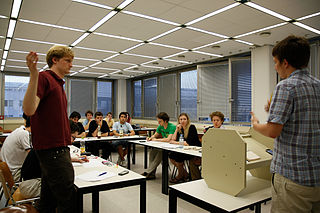By Eduardo Daniel Ramírez Silva
teacherdanielram@gmail.com
“The aim of argument, or of discussion, should not be victory, but progress.”
-Joseph Joubert-.
When we hear the words “discuss” or “argue”, we relate them to quarreling or imposing one truth over another. However, discussion (or argument) is an exercise involving an exchange of ideas about a specific topic generated between two or more people. In other words, it offers the ideal moment for talking and listening to gain insight into a situation and create a solution.
What is the difference between a discussion and a debate? Having clarified the previous point, a debate is also an exercise in which participants share their points of view about an issue. However, in debates ideas are expressed in an organized manner, and people play a specific role while adhering to a protocol under the guidance of a moderator.
Classrooms are spaces for interaction and knowledge construction, offering the ideal setting for debate as an engaging teaching strategy that educators should employ more often, given its benefits not only for students, but also for teachers.
The benefits fostered by debates include: motivation, since it gives students the space and time to express themselves freely, with the implied responsibility; a participative attitude, according to the role to be played by the students; a culture of respect and tolerance, because given the enormous diversity of thought, we must listen to others and be open to new forms of viewing the debated situation. In addition, a sense of identity is generated according to the stance being defended and the proposals constructed during the exercise.
The main goal of debate is to sow a seed that will emerge on the surface of social impact.
Moreover, teamwork is strengthened, students complement each other and all the participants work collaboratively and with a sense of responsibility to achieve specific common objectives. Another advantage is related to the investigation process required to defend a stance, because it helps to develop skills in searching for trustworthy, reliable information and sources in which to ground arguments. Logical-critical thinking and argumentation emerge once information has been appropriated and constructed through the capacity to create evidence-based affirmations and rationales on a structure oriented toward a stance, either for or against, to demonstrate a reasonable truth.
Debate enhances students’ levels of public speaking since it allows them to express and transmit clearly what they think, according to the stance defended. Students also become more assertive in their verbal and non-verbal communication, showing greater maturity when communicating their arguments, prioritizing the value of respect for others.
Reading habits are created or reinforced since students need to keep abreast and aware of the diverse political, economic, social and cultural realities, and to form their own criterion about the same. Leadership is another skill developed in debates, since all the participants find themselves in a situation of constant interrelation in which everyone motivates and supports each other, fulfills their duties and pursues a common objective.
This exercise creates strong ties, forming a close-knit learning community in which students seek their own individual growth, as well as that of their teammates, and pursue a more solid education that will prepare them to face adversity resulting from an increasingly crude reality.
The main goal of debate is to sow a seed that will emerge on the surface of social impact. In other words, the organized discussion of ideas goes beyond the classroom; once a topic has been debated, students gain a sense of accountability that leads them to envisage a different reality, thus encouraging them to implement social transformation projects.
The aim of debates is not the victory of a stance, but the progress of societies.
In conclusion, it must be clearly understood that neither discussion nor debate are synonyms of quarrelling. The aim is not to impose a rationale but rather to develop cognitive emotional and social intelligence skills. For debate to become meaningful learning, participants must know what they are talking about, since all social construction should be debated and be the objective of an ethical dilemma, either factual or of a political nature, upon which students can progress to achieve a proposal or action that will provide a solution. Debate is not just about memorizing texts, but also comprehending and giving meaning to information, providing it with a criterion and enriching the capacity to interpret reality. The aim of debates is not the victory of a stance, but the progress of societies. Nobody wins or loses in a debate, but everyone learns.
About the author:
Eduardo Daniel Ramírez Silva holds a B.A. in Cultural Management and is currently studying a Master’s in Education. He teaches high school classes in Ethics, Literature and the Socioeconomic Structure of Mexico, and is in charge of Orientation and Tutoring for high school freshmen, coordinates the debate team and implements reading promotion projects. He is also an independent cultural project advisor, designer and assessor.
This article from Observatory of the Institute for the Future of Education may be shared under the terms of the license CC BY-NC-SA 4.0 
)
)



)